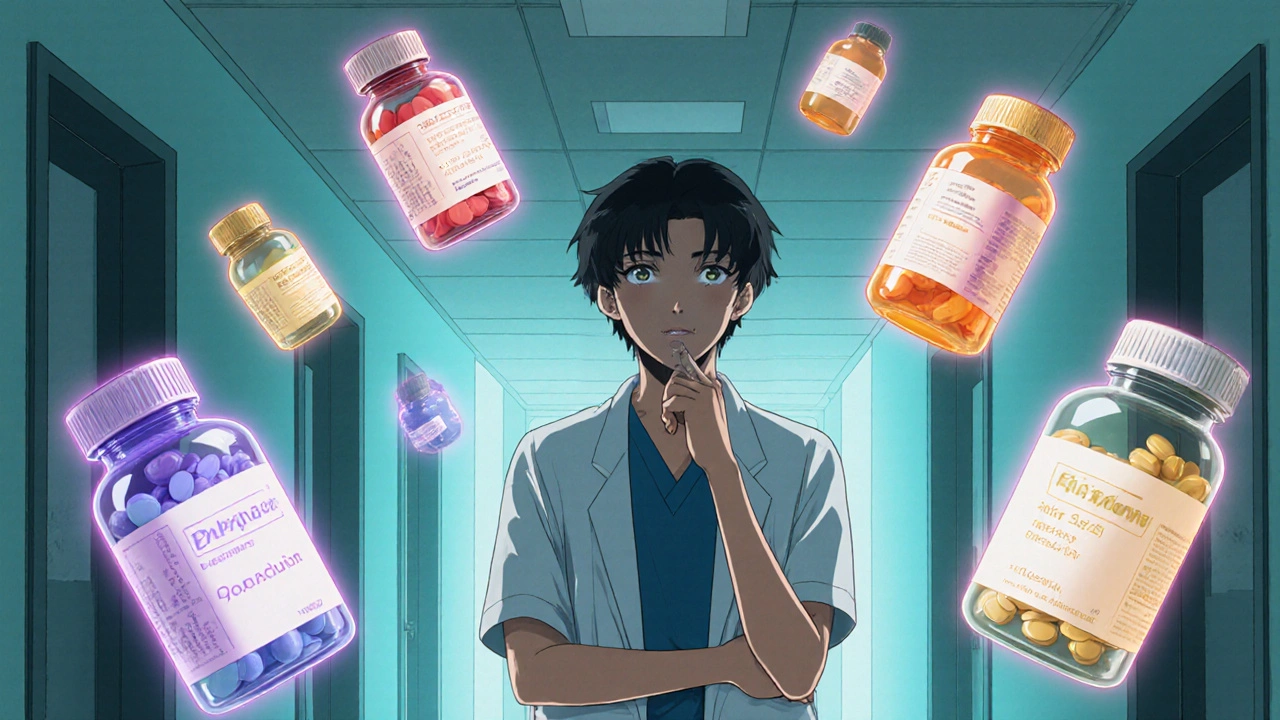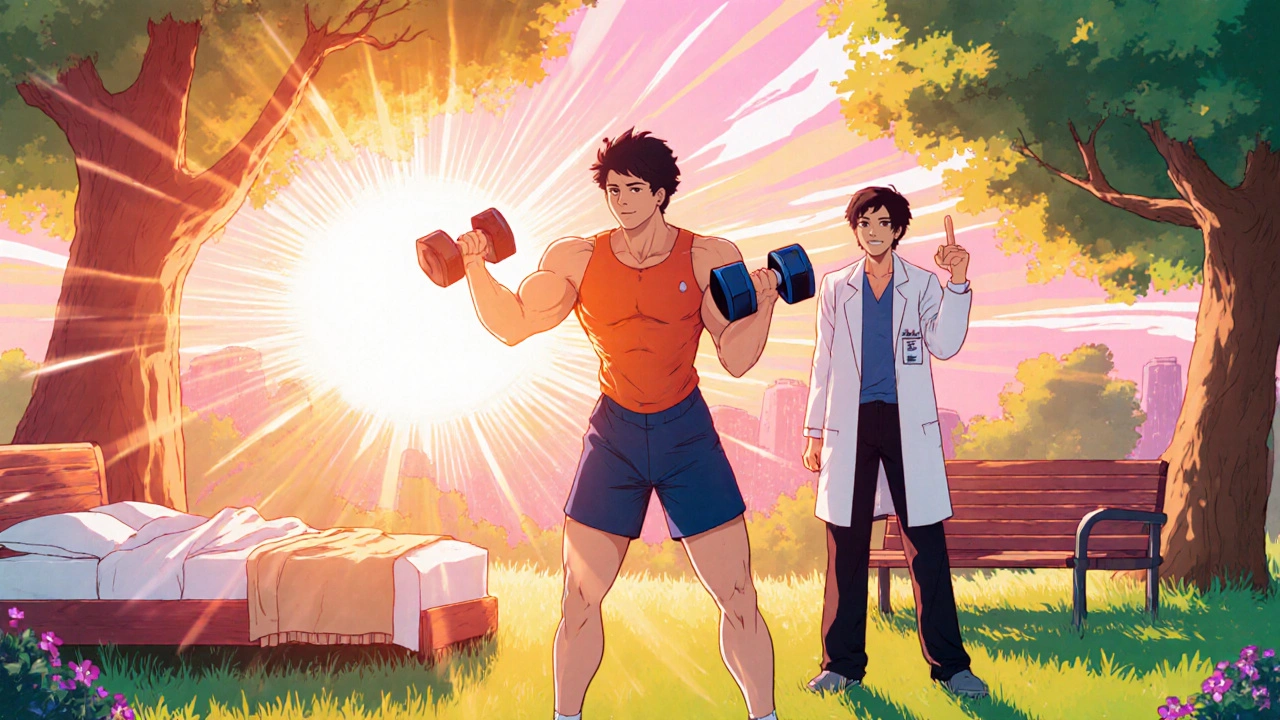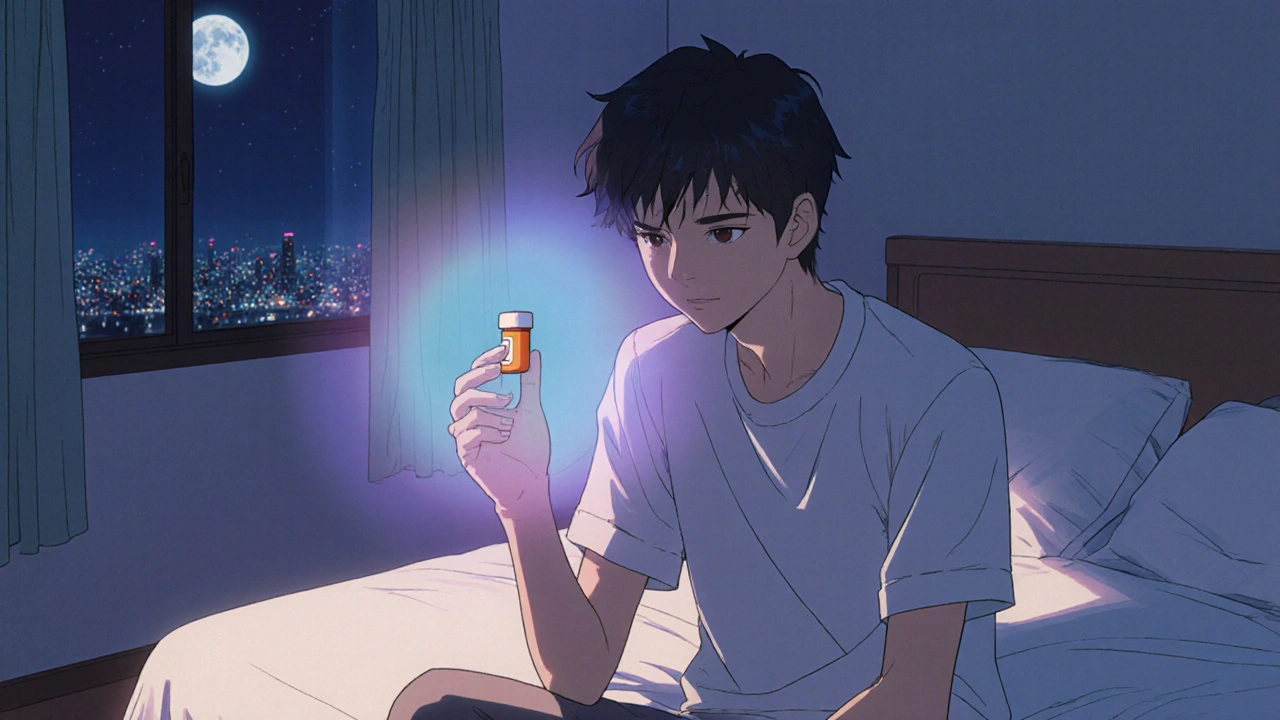Key Takeaways
- Many prescription drugs, from antidepressants to blood pressure meds, can blunt sexual desire.
- Understanding the mechanism helps you discuss alternatives with your clinician.
- Adjusting dose, timing, or switching to a different agent often restores libido.
- Non‑drug strategies - exercise, stress reduction, proper sleep - boost sexual drive and support medication changes.
- Seek professional help if low desire persists, as it may signal deeper hormonal or psychological issues.
Ever notice that after starting a new pill, your interest in sex just…fades? You’re not alone. decreased sexual desire is a common, yet under‑discussed, side effect of a wide range of medicines. Below we unpack why this happens, which drugs are most likely to be the culprits, and practical steps you can take to get your spark back.
Decreased sexual desire is a form of sexual dysfunction characterized by a reduced interest in sexual activity. It can stem from hormonal shifts, psychological stress, or, as we’ll explore, medication side effects. Understanding the root cause is the first move toward a solution.
Why Medications Mess With Your Libido
Most drugs hit the brain or hormone pathways that regulate sexual arousal. When a medication interferes with neurotransmitters like serotonin or dopamine, or alters hormone levels such as testosterone, the brain’s “go” signal for sex can get muted. In some cases, the drug simply adds fatigue or dry mouth, indirectly dampening desire.
Think of your body as a orchestra. Each instrument - hormones, nerves, blood flow - has to play in sync. A medication can be a mis‑tuned violin, throwing the whole piece off‑key.
Common Medication Classes That Lower Libido
Below is a quick glance at the drug families most frequently linked to a drop in sexual desire.
| Class | Typical Examples | How It Affects Libido | Management Tips |
|---|---|---|---|
| Antidepressants (SSRIs) | Fluoxetine, Sertraline, Citalopram | Boosts serotonin, which can suppress dopamine‑driven desire | Switch to bupropion, dose‑reduce, add sexual‑enhancing agents |
| Beta‑blockers | Propranolol, Atenolol | Lowers heart rate and blood flow, can cause fatigue | Try selective beta‑1 blocker, adjust timing, consider ACE‑inhibitor |
| Antihypertensives (ACE‑inhibitors, ARBs) | Lisinopril, Losartan | Generally neutral, but some patients report reduced desire | Monitor, switch to calcium‑channel blocker if needed |
| Antipsychotics | Risperidone, Olanzapine | Block dopamine receptors - dopamine fuels sexual interest | Consider atypical antipsychotic with lower prolactin rise, add dopamine agonist |
| Hormonal contraceptives | Combined oral pill, hormonal IUD | Elevates estrogen, can lower free testosterone | Switch to non‑hormonal method, discuss progestin‑only options |
| Opioids | Hydrocodone, Oxycodone | Suppresses hypothalamic‑pituitary‑gonadal axis, cuts testosterone | Reduce dose, rotate to non‑opioid analgesics, consider testosterone replacement |
| Antiandrogens | Spironolactone, Finasteride | Blocks androgen receptors, directly lowering libido | Assess necessity, switch to alternatives, monitor hormone levels |

Deep Dive: How Specific Drugs Hit the Desire Switch
Antidepressants, especially selective serotonin reuptake inhibitors (SSRIs), are notorious for dampening sexual drive. By increasing serotonin, they unintentionally suppress dopamine, the brain’s pleasure messenger. A 2022 meta‑analysis of 45 trials found that up to 40% of SSRI users reported reduced libido.
Beta‑blockers lower heart rate and can cause vivid fatigue. The reduced blood flow to the genitals, combined with a general sense of sluggishness, often leads to a drop in desire. One small UK study showed a 23% decline in sexual satisfaction among patients switched from a calcium‑channel blocker to a beta‑blocker.
Antipsychotics such as risperidone raise prolactin levels, which directly inhibit gonadal hormone production. The result is a classic case of “low testosterone, low libido.” Prolactin‑sparing atypicals like aripiprazole may be a better fit for patients worried about sex.
Hormonal contraceptives, while excellent at preventing pregnancy, increase circulating estrogen and can bind up free testosterone. For some women, this translates to a noticeable dip in sexual interest, especially during the first few months of use.
Opioids are a double‑edged sword. Aside from pain relief, they blunt the hypothalamic‑pituitary‑gonadal axis, essentially shutting down the body’s natural testosterone production. Chronic opioid therapy can lower testosterone by up to 70% in men, and similar trends are seen in women with reduced estrogen levels.
Antiandrogens, used for conditions like acne or prostate enlargement, directly block androgen receptors, the very pathway that fuels desire. Finasteride, for example, has been linked in several surveys to a 15% drop in sexual interest.
What to Do When Your Medication Is Killing Your Mojo
First, don’t blame yourself. Medication‑induced libido loss is a medical issue, not a personal failing. Here’s a practical roadmap.
- Review the timing. Some drugs cause peak side effects a few hours after dosing. Adjusting the time you take the medication (e.g., before bedtime) can reduce daytime desire loss.
- Ask about dose reduction. Lowering the dose may keep therapeutic benefits while easing sexual side effects. Always do this under a doctor’s guidance.
- Swap for an alternative. For depression, bupropion (Wellbutrin) has a much lower risk of libido loss. For blood pressure, an ACE‑inhibitor or ARB can be gentler on sex drive than a beta‑blocker.
- Consider add‑on therapy. Medications such as sildenafil (for men) or flibanserin (for pre‑menopausal women) can help restore function while you stay on the primary drug.
- Check hormone levels. A simple blood test for testosterone, estrogen, and prolactin can reveal whether the drug is causing hormonal suppression. If levels are low, hormone replacement may be an option.
- Explore non‑pharmacologic fixes. Regular exercise, especially resistance training, boosts testosterone naturally. Reducing alcohol, managing stress, and ensuring 7‑9hours of sleep also improve libido.
Always keep an open line with your prescriber. Bring a list of the specific side effects you’re experiencing - it helps them understand the severity and act quickly.

When to Seek Specialist Help
If you’ve tried dose tweaks or switching meds and the desire loss persists for more than three months, consider a referral to a sexual health specialist or an endocrinologist. Persistent low libido can be a sign of underlying conditions such as hypogonadism, thyroid disorders, or depression that need dedicated treatment.
Quick Checklist for Patients
- Write down every medication you’re taking, including over‑the‑counter supplements.
- Note the exact time you take each pill and any changes in sexual interest.
- Schedule a 15‑minute appointment with your GP to discuss the pattern.
- Ask about alternative drugs or dose adjustments.
- Consider a baseline hormone panel.
- Implement lifestyle boosts: 30minutes of moderate exercise, 8hours sleep, stress‑relief practice.
Frequently Asked Questions
Which antidepressant is least likely to affect libido?
Bupropion (Wellbutrin) works primarily on dopamine and norepinephrine, bypassing the serotonin pathway that most SSRIs target. Clinical data show a markedly lower incidence of sexual side effects, often making it the first switch option for patients troubled by low desire.
Can I safely stop a beta‑blocker to improve my sex life?
Never stop a prescription abruptly. Talk to your doctor; they may taper the dose, switch you to a different class, or add a short‑acting alternative that you can take only when needed. Sudden withdrawal can cause rebound hypertension or heart rhythm issues.
Do hormonal IUDs affect libido?
Most users report minimal impact, but a subset experiences reduced desire due to the systemic progestin effect. If this happens, switching to a copper IUD or a non‑hormonal method can resolve the issue.
Is testosterone therapy safe for men with opioid‑induced low libido?
When testosterone levels are confirmed low, replacement can be effective and safe, but it requires regular monitoring of hematocrit, PSA, and liver function. Discuss with both your pain specialist and an endocrinologist.
Should I avoid alcohol while trying to fix medication‑related libido loss?
Alcohol is a depressant that can worsen fatigue and hormone imbalance, magnifying drug side effects. Cutting back to moderate levels (no more than 1‑2 drinks per day) often improves both mood and sexual desire.
Bottom line: medication‑induced decreased sexual desire is a solvable problem. By identifying the offending drug, exploring alternatives, and supporting your body with healthy habits, you can reclaim a satisfying sex life without sacrificing your health.


Comments (15)
Rebecca Mitchell October 17 2025
So you’ve been on an SSRI and the bedroom feels like a museum you never want to visit
Roberta Makaravage October 24 2025
It’s a moral imperative to demand that pharmaceutical companies disclose every libido‑sapping side effect before they ever push a pill on the market 🌍. The data show that up to 40% of patients on SSRIs experience a noticeable dip in desire, and yet we are left to suffer in silence 🙄. You deserve a treatment plan that respects both your mental health and your sexual wellbeing, because a life without desire is not a life fully lived 💡. Seek out clinicians who are willing to discuss alternatives like bupropion, or who can adjust dosages without compromising your therapy 🩺. In the end, the power lies with you, and no one should be forced to choose between mood stability and a satisfying sex life 🚀
Lauren Sproule October 31 2025
Hey there i totally get how frustrating meds can mess with your mojo we’ve all been there and it’s okay to talk about it openly. A lot of the time just timing your dose or a gentle switch to something like bupropion can make a huge difference. Also remember that regular movement and proper sleep are like free boosters for your hormones. If you ever need a buddy to chat with about options feel free to drop a line we’re all in this together
Patricia Echegaray November 7 2025
Don’t be fooled by the mainstream narrative that all blood pressure meds are harmless – the hidden agenda is to keep the population docile and compliant, even if it means crushing their passion 🚨. The elite pharmaco‑elite love betting on beta‑blockers because they know the dulling effect on blood flow also dulls the fire of dissent 🔥. If you suspect your prescription is a tool of control, demand a full review and swap to a calcium‑channel blocker that won’t mute your spirit. Remember, every pill has a political price, and your libido is the first thing they target to keep you subservient. Stay vigilant, stay passionate, and never let a pill dictate your personal sovereignty.
Samantha Oldrid November 14 2025
Oh great another drug that kills the bedroom, just what we needed.
Russell Abelido November 21 2025
I feel you, buddy, it’s like your inner fire got smothered by a blanket of pills 😞. Imagine your mind as a stage and the medication as a heavy curtain that never lifts – the show just can’t go on. Talking to a doc about swapping to something like Wellbutrin can be the spotlight you need. Keep your chin up, and remember you’re not alone in this silent struggle 😊
Tom Green November 28 2025
It’s important to approach this with a balanced view – while some medications do affect desire, they’re also often life‑saving. By keeping a detailed log of what you take and when symptoms appear, you give your healthcare provider concrete data to work with. Many patients have successfully transitioned to alternatives with minimal impact on mental health, so don’t lose hope. If you need a template for tracking or tips on how to discuss it with your doctor, just let us know.
Emily Rankin December 5 2025
Consider the body as an orchestra, where each medication is an instrument that can either harmonize or discord the symphony of desire 🎻. When a note falls flat, we have the power to retune it, whether through a dosage shift, a new prescription, or a lifestyle crescendo like strength training. The future holds promise – advances in psychopharmacology are already aiming for mood‑lifting without the side‑effect of libido loss. Stay hopeful, stay proactive, and let your inner melody guide the choices you make. After all, a fulfilled life is composed of both mind and body in perfect rhythm.
CHIRAG AGARWAL December 12 2025
Honestly these drug side‑effects are overhyped, just deal with it and move on.
genevieve gaudet December 19 2025
In many cultures the conversation about sex is wrapped in shame, so when a pill quietly steals your desire it feels like a betrayal of tradition ✨. It’s not just a medical issue but a cultural one, because sexual health is tied to identity and community. A simple blood test can reveal whether your hormones are being suppressed, giving you the evidence to negotiate with your doctor. Also, exploring practices like yoga or traditional dance can reconnect you with your body’s natural rhythms. Don’t let a prescription silence the narrative that belongs to you and your ancestors. Share your story, it might help someone else break the taboo.
Malia Rivera December 26 2025
Freedom of the individual is compromised when the state‑approved meds dictate our innermost drives 🌐. The philosophical truth is that a nation cannot thrive if its citizens are chemically dulled. While some drugs are necessary, we must question the blanket prescriptions that ignore personal liberty. A balanced critique reveals both the medical need and the civic cost. Keep questioning and demand options that respect both health and autonomy.
lisa howard January 1 2026
When I first learned that a common blood pressure medication could quietly erode the very spark that fuels intimacy, I was both startled and intrigued, for it seemed to me that the pharmaceutical world was daring to play god with our most private selves. The notion that a pill designed to keep your heart beating could also be a silent assassin of desire is a paradox that demands scrutiny, especially when the evidence is tucked away in obscure side‑effect tables that most patients never see. Over the years I have spoken with countless individuals who, after months on a beta‑blocker, found their evenings devoid of the tender moments they once cherished, and they described it as a gradual dimming of a once‑bright lantern. Some of them, in their desperation, turned to natural remedies, such as vigorous cardio, meditation, or even the ancient practice of ayurvedic herbs, hoping to rekindle the flame that the drug had smothered. Others consulted their physicians and were met with a weary shrug, a prescription refill, and an admonition to “just be patient,” which only amplified the sense of helplessness. I have also observed that the medical community, while earnest in its intent, sometimes lacks the time or incentive to explore dose timing adjustments that could mitigate these side effects, such as taking the medication at night to allow the body to reset during sleep. Moreover, the psychological impact of believing that your desire is chemically suppressed can become a self‑fulfilling prophecy, creating a feedback loop that deepens the problem. It is crucial, therefore, to approach the issue with both scientific rigor and compassionate understanding, acknowledging that each patient’s experience is unique. By maintaining a meticulous log of medication schedules, mood fluctuations, and sexual interest, one can furnish the doctor with concrete data that may prompt a thoughtful reconsideration of the treatment plan. In many cases, a switch to a drug with a lower propensity for libido loss, such as bupropion for depression, can restore normalcy without sacrificing mental health. The conversation should also extend beyond the clinic; partners play a vital role in recognizing changes and supporting adjustments, turning a solitary struggle into a shared journey. Finally, societal attitudes toward sexual health must evolve, shedding the stigma that has historically kept such discussions in the shadows, thereby empowering patients to advocate for themselves without shame. In my view, the intersection of pharmacology, sexuality, and personal agency is a frontier that deserves our collective attention, research, and empathy. Only then can we hope to wield medicine as a tool for healing rather than a hidden chain that binds the heart and the body alike.
Cindy Thomas January 8 2026
While many celebrate the “new pill” as a miracle, I’ve got to point out that the data are often cherry‑picked and the long‑term consequences ignored 🙃. If you look past the glossy press releases, you’ll see a pattern of suppressed libido that isn’t just a side effect but a symptom of hormonal imbalance. My experience tells me that lifestyle tweaks, like a Mediterranean diet and daily stretching, can offset much of what the drug tries to do. Don’t let the hype drown out your own intuition – trust your body’s signals. 😏
Kate Marr January 15 2026
🇺🇸 Our country deserves citizens who are at their peak, not chemically dulled by the “big pharma” elites 🤚. If a medication is stealing your drive, it’s not just a personal issue – it’s an assault on national vitality 🛡️. Push for alternatives, demand transparency, and protect the strength of our great nation 💪
James Falcone January 22 2026
Can’t let some prescription ruin our American mojo, gotta keep it real.